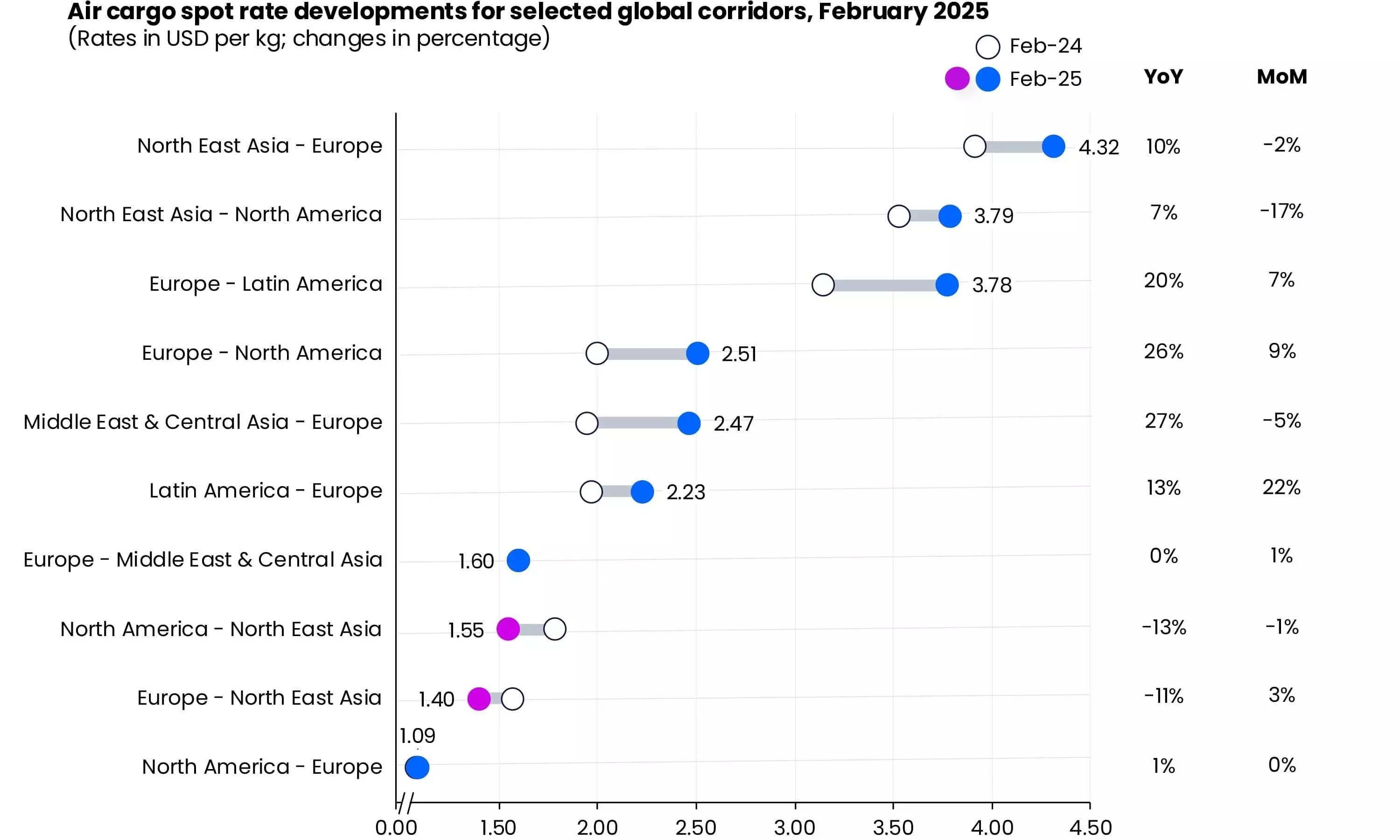
Slump in Shanghai spot rates indicator for e-commerce volumes
Global spot rate in February increased at its slowest pace YoY since June 2024, rising by +10% to $2.53 per kg.

Source: Xeneta
The political game between some of the world’s biggest trading nations may have taken its first nibble at international e-commerce volumes in February.
Global air cargo spot rates from Shanghai to the U.S. declined -29% month-on-month to $3.23 per kg, according to the latest industry analysis by Xeneta.
"Even allowing for the earlier Lunar New Year and the seasonal e-commerce slowdown at the start of the year, the fall in Shanghai-U.S. spot rates, following the United States’ temporary removal of the de minimis exemption on Chinese shipments, may be one of the first indicators that the regulatory/political conversations are starting to affect the air cargo market," according to Niall van de Wouw, Chief Airfreight Officer, Xeneta.
"When the e-commerce boom took off, it very quickly clogged up the Hong Kong and southern China market because of so much outbound demand. So, the e-commerce market started to venture eastwards to Shanghai, even though it was less desirable due to additional cost.
"If a fall in e-commerce volumes means there’s currently more available capacity to do business out of Hong Kong and southern China again, we would expect Shanghai to be the first market to feel this impact, and that’s what we saw in February. This may be short-term, but the uncertainty around e-commerce is impacting the market.”
In comparison, the Shanghai-to-Europe spot rate saw only a modest two percent month-on-month decline to $3.86 per kg, the update added.
"Overall, global air cargo demand grew by four percent year-on-year in February, marking a continued slowdown from the double-digit growth seen in every month of 2024. By calibrating the earlier Lunar New Year this year, the combined air cargo demand for January and February rose by a modest three percent compared to the previous year. In addition to the U.S. de minimis change, other factors likely influencing the monthly performance included a high comparison base in 2024 and the diminishing impact of Red Sea disruptions on air cargo volumes as supply chains continued to adapt to longer transit times."
Supply of global air cargo capacity in February also stayed flat - the combined January and February capacity edged up by just one percent while the dynamic load factor for the first two months of 2025 remained unchanged from a year ago at 59 percent in February. (Dynamic load factor is Xeneta’s measurement of capacity utilisation based on volume and weight of cargo flown alongside available capacity.)
"The global air cargo spot rate (valid for up to one month) in February increased at its slowest pace year-on-year since June 2024, rising by +10 percent to $2.53 per kg. In contrast, the global seasonal rate (valid for longer than one month) dropped one percent year-on-year to $2.21 per kg, reflecting the market’s changing supply/demand dynamics."
Among the major global corridors, the Northeast Asia to Europe market saw a +10 percent YoY to $4.32 per kg while the Northeast Asia to North America spot rates experienced the steepest month-on-month decline, dropping -17 percent to $3.79 per kg, the update added.
"With general cargo demand in the doldrums in recent years, the surge in e-commerce has been the saviour of the air cargo market performance. If this now takes a significant hit, if that happens, it will have a profound effect on airfreight rates around the world,” says van de Wouw.
For now, the big e-commerce players and general cargo shippers are buying time instead of cargo capacity to avoid commitments which might bring added financial risk. "From the conversations we are hearing, some shippers are clearly looking for ways to minimise the impact of U.S. tariffs while others will be anticipating lower airfreight rates if e-commerce volumes show a sustained dip."
Uncertainties surrounding trade tensions
The tariffs imposed by the Trump administration and the awaited international response are causing increasing ripple effects across the global air cargo market, prompting strategic adjustments from key stakeholders, the update added.
Airlines: With upcoming summer schedule changes and ongoing trade tensions, airlines are currently reassessing their freighter capacity strategies. Many may opt to shift routes toward Southeast Asia rather than China or reposition capacity to the Transatlantic market.
Freight forwarders: Uncertainty in the market has led to freight forwarders delaying their Block Space Agreement (BSA) negotiations with airlines as they await more clarity on demand and pricing.
Shippers: Some shippers are postponing annual contract negotiations from Q22025 while opting for shorter-term agreements in the first half of the year.
"This is a situation completely outside of the control of the air cargo market and there’s a great deal of noise, which is adding to stakeholders’ anxiety. The issue is no one knows what the end game is and what’s going to happen from a regulatory perspective, and how this will impact consumer confidence."

